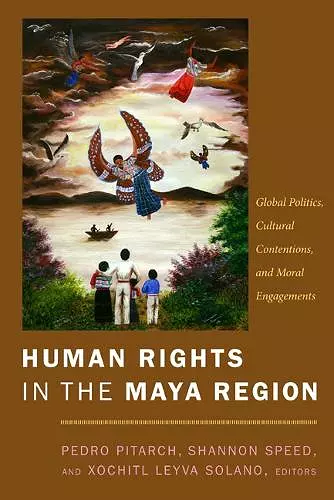Human Rights in the Maya Region
Global Politics, Cultural Contentions, and Moral Engagements
Pedro Pitarch editor Xochitl Leyva-Solano editor Shannon Speed editor
Format:Paperback
Publisher:Duke University Press
Published:5th Dec '08
Currently unavailable, and unfortunately no date known when it will be back

Human rights and anthropology's involvement with human rights in Mesoamerica
Includes a reflection on the effects of truth-finding and documenting particular human rights abuses, a look at how Catholic social teaching validates the human rights claims advanced by indigenous members of a diocese in Chiapas, and several analyses of the limitations of human rights frameworks.In recent years Latin American indigenous groups have regularly deployed the discourse of human rights to legitimate their positions and pursue their goals. Perhaps nowhere is this more evident than in the Maya region of Chiapas and Guatemala, where in the last two decades indigenous social movements have been engaged in ongoing negotiations with the state, and the presence of multinational actors has brought human rights to increased prominence. In this volume, scholars and activists examine the role of human rights in the ways that states relate to their populations, analyze conceptualizations and appropriations of human rights by Mayans in specific localities, and explore the relationship between the individualist and “universal” tenets of Western-derived concepts of human rights and various Mayan cultural understandings and political subjectivities.
The collection includes a reflection on the effects of truth-finding and documenting particular human rights abuses, a look at how Catholic social teaching validates the human rights claims advanced by indigenous members of a diocese in Chiapas, and several analyses of the limitations of human rights frameworks. A Mayan intellectual seeks to bring Mayan culture into dialogue with western feminist notions of women’s rights, while another contributor critiques the translation of the United Nations Declaration of Human Rights into Tzeltal, an indigenous language in Chiapas. Taken together, the essays reveal a broad array of rights-related practices and interpretations among the Mayan population, demonstrating that global-local-state interactions are complex and diverse even within a geographically limited area. So too are the goals of indigenous groups, which vary from social reconstruction and healing following years of violence to the creation of an indigenous autonomy that challenges the tenets of neoliberalism.
Contributors: Robert M. Carmack, Stener Ekern, Christine Kovic, Xochitl Leyva Solano, Julián López García, Irma Otzoy, Pedro Pitarch, Álvaro Reyes, Victoria Sanford, Rachel Sieder, Shannon Speed, Rodolfo Stavenhagen, David Stoll, Richard Ashby Wilson
“The notion of ‘universal human rights’ has had a checkered career over the past sixty years. Touted by some as one of the most effective tools for the empowerment and liberation of women and the poor in the so-called third world, it is denounced by others as a self-serving cultural imposition on the part of the Western world. Human Rights in the Maya Region takes us well beyond these extreme positions. By focusing on an exemplary case—the diverse experiences of the Mayan peoples of Chiapas and Guatemala—and never belittling the existing power asymmetries or the complexities of cultural translation, this coherent and well-grounded volume enlightens us on the multiple ways in which local groups make effective use of rights discourses on the basis of their distinct conceptions of persons and the world. At a more general level, the volume offers a nuanced and compelling explanation of the conjunctures of culture, rights, and power that are at play whenever ‘rights’ are deployed anywhere in the world. The volume will be of great value to those interested in human rights, indigenous peoples, social movements, traditional law, and the cultural-political dynamics of globalization.”—Arturo Escobar, author of Territories of Difference: Place, Movements, Life, Redes
“This is an important book. It brings together in one place state-of-the-art pieces by the scholars and scholar-activists who have made—and are making—the Maya area, especially Chiapas and Guatemala, one of the leading regions in the world for the theory and practice of indigenous human rights advocacy.”—Jan Rus III, coeditor of Mayan Lives, Mayan Utopias: The Indigenous Peoples of Chiapas and the Zapatista Rebellion
ISBN: 9780822343134
Dimensions: unknown
Weight: 549g
392 pages